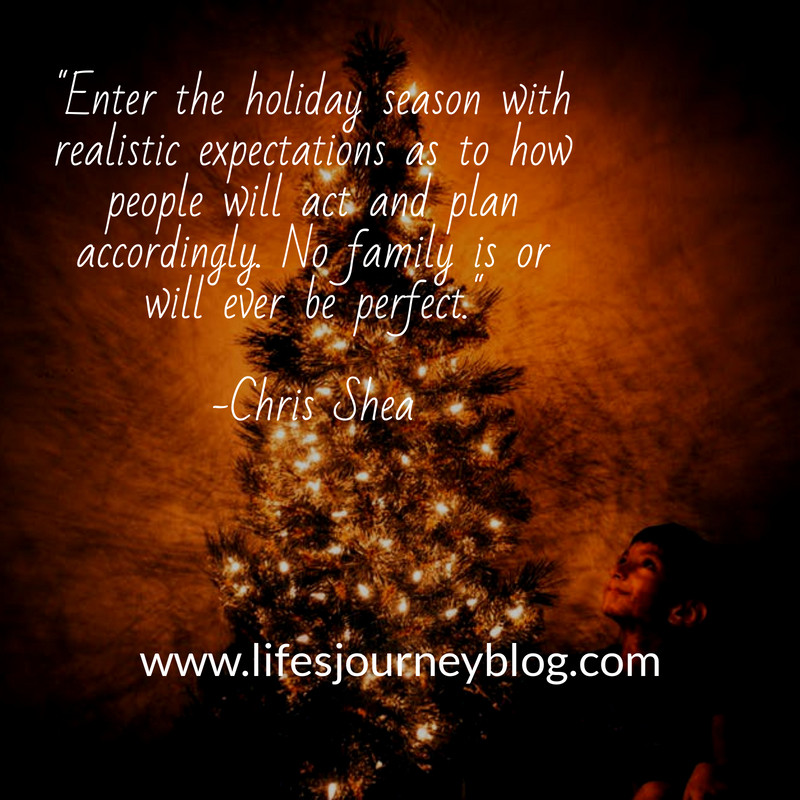Archive for December 2019
Changing Perspective On The Holiday Season
Changing perspective on the holiday season is so crucial for us in finding happiness and peace. The stress and busyness of the holiday season have me reflecting on the topic of keeping perspective on the holidays. If I change how I think about, or view, the holidays, then how I view and cope with the stress of the holidays will change.
(This article is based on a transcript from my podcast episode posted December 21, 2019)
When I talk about the holiday season, I’m not talking in any particular religious meaning. Regardless of your belief or how you celebrate this time of the year, the fact remains this a very hectic time. In changing my perspective on the holiday season, namely, my expectations will change how I view the season, and so reduce my stress.
Expectations
Many of us have expectations of what this time of the year should be. Families and our traditions place these expectations upon us. So when we’re looking at these expectations it puts a high level of achievement, a high level of making sure that what we do equals previous years’ celebrations.
Expectations on celebrating and honoring one’s traditions is a worthy goal to have as long as it is a realistic goal. When I talk about perspective maybe we need to shift our thoughts and views about some of our traditions in our approach to this season to give it a whole different perspective. I know this time of the year there’s talk about getting away from the commercialization of the season. I agree that as a society, we’ve allowed the holidays to become consumerism focused.
Consumerism
When you think about it, the consumerism of the holidays tends to give us stress! So it begs the question, what is the real meaning of the holiday season? Since there are many different cultures and religious traditions that celebrate this time of the year, let’s examine the purpose of the season in a very large and general picture.
The holiday season was meant to be, from its inception, a time to spend with family, with loved ones, and a time to take stock of what life really means. Given the longer nights of the Winter season, this is a perfect time for us to take stock of our lives.
Yet, as the Winter progresses, the days get a little bit longer as we experience a little bit more daylight each day. This little bit of sunlight each day gives us hope. This sense of hope impacts our perspective and any changes we wish to make about it.
If my perspective on the holiday season is based solely on appearances, decorations, parties, gifts, etc. as the only meaning of this season, then my view, shaped by society and tradition, places such a demand (expectation) on me that my stress will be high. So how do I lower my stress? Change my perspective on the holiday season. To quote the Grinch, “maybe Christmas means a little bit more.”
Perspective Shift
So what is important to you in life? Is it appearances and material goods? Or maybe it’s family and close friends. If I can focus on the importance of love of family and friends, then the rest of the” things” of the season aren’t as important. I’m not saying that we get rid of all consumerism, but what is your priority this time of the year? What in life genuinely makes you happy, peace-filled, and feel loved?
Surrounding oneself with loved ones while celebrating your togetherness is relatively stressing and expectation free. It’s only you being yourself, knowing you’re respected and honored simply for you being you. It can’t get much better than that.
Now imagine a holiday focused on the expectation of pleasing and impressing those same people. The more you believe, the more your stress increases as you think of all that has to now be accomplished and done with perfection. Which scenario do you choose?
Consumerism grows as material goods build upon material goods. You purchase one item, but now you need some of the accessories, and some of those need special connectors and cords. Now you’re buying more and more, and needing to carry with you more and more things. See, all of these things build upon each other so that one material good equates to many more material goods, If we’re looking for a way to find some peace in our lives begin to change your perspective and declutter. I’m not advocating that we get rid of all of our material goods, but to re-examine the products we already possess.
As an example, I turn to one of the persons in history who inspires me; Saint Francis of Assisi. He was a Catholic preacher and monk back in the 1100s and 1200s who gave up everything he owned to live a life of complete poverty and ministry to others.
As Francis’ reputation for caring and compassion spreads throughout the area, other men decide to follow Francis, and they too give up everything they own. Francis and his followers are proud of their accomplishments in ministry due to their freedom in not owning possessions.
On one occasion, it’s documented that some of the Brothers asked Francis if they could purchase an educational book for all of the brothers to use. Francis himself was not against learning, but he uses the opportunity to explain to them the importance of not gathering material goods. Francis replies by asking if we get a book where we going to store that book? We need a place to store the books so that the book stays safe. So we’re going to have to build a building. Yet if we build a structure to put the book in we’re going to have to make sure that when we’re not around, that book remains safe, so we may have to put some locks on that building.
And then once we put the locks on the building, people will get suspicious of what’s in a locked building that we may have to hire some people to keep an eye on that building. Francis’s point being is this one book; this one material object is causing them to build a structure that will need to be secured.
Francis’ other lesson in his response to the Brothers pertains to one’s focus and priorities. If the book were in the guarded building, how focused would the Brothers be on the ministry to others versus on the status and care of the book? The takeaway from the story is not that Francis is anti-education, but that Francis wanted his Brothers to be wholly and entirely focused on serving God without any other care or stress. In other words, a perspective shift on the meaning of material goods.
Place Francis’s story into your modern life. Think of the material goods we have. Is it not true that once we obtain an object that it might mean we accumulate other objects to go along with that object and/or the debt of the object(s) indicating the longer, we may have to work, taking us away from our family. Yet honestly, what’s more, important to us; those goods we’re working for or our family?
The Challenge
My challenge for all of us is to refocus our lives on those things which are meaningful to us. Then examine what our priorities are now. If my priorities are causing me stress and defocusing me from my priorities, then what changes in my life do I need to make to realign my priorities and my life?
So that’s my challenge for us during this holiday season, to change your perspective so that your priorities in life match your actions such that you find hope and enjoy peace this holiday season.
{loadmoduleid 140}
Christmas – A Spiritual Journey
My gift to you!
“A Spiritual Journey of Christmas”. In this short booklet, I spiritually reflect on Christmas, Mary, and New Years. The holiday season is filled with mindful opportunities for reflection and meditation toward improving our happiness and inner peace. I hope this booklet of my reflections helps guide your reflections. -Chris
{loadmoduleid 140}
Coping With Family Stress To Bring Peace To The Holidays
Coping with family stress during the holidays can seem like a given. Many of us anticipate that family will get on our nerves, make us upset, or get us angry. Understanding that stress, especially during the holidays, will happen, then coping with family stress becomes more manageable and doable since we expect to feel and experience that family stress.
Coping with family stress comes with the season. Sure, family stress happens all year. Still, during the holiday season, it amps up, becoming stronger and more widespread amongst families. Family stress is defined as a disturbance in the steady-state of the family system. The disturbance can emerge from the outside, from inside the family, or both simultaneously.
Why does this happen? Why during a time of the year when we try to be cheerful and happy are families more stressed?
I feel that the answer to that question is two-fold. The holiday season itself can cause stress. Families need to make preparations for travel, the arrival of other family members, meal prep, getting gifts, decorating, and meeting the expectations of traditions. There’s a lot of responsibility placed on many people during a short couple of months. But we all know how the family will talk for years to come if just one aspect of the holidays doesn’t go as they wanted or expected. That’s a lot of pressure to place on people.
Bonus: Download Chris Shea’s booklet on Life Coaching & is it for me? Click here to get it
The other part of the answer to the question is that families who may spend much of the year physically separated are now coming back together. Children out on their own for the first time, feeling that sense of freedom, are now back in their parent’s house, struggling with being an adult while once again being treated like a child. Or family members who get along well through phone or video chats, find that living under the same roof, even temporarily, is a reminder of why they moved away.
Put these two reasons together, not unlike distant family members coming together, and we have the answer as to why coping with family stress is such an issue this time of the year. Tensions are high to achieve perfection, and family members are moving back, the perfect storm in which to brew stress.
So what can we do about this? Do we resign ourselves to an uncomfortable holiday as we assume stress to be inevitable? Not at all. Actually, the “answer” starts with the formulation of the question itself.
Expectations
If you know there will be family stress during the holiday, base your expectations as such. If you know that one uncle will be drunk once again, or that cousins whom you can’t stand will be at a function, base your expectations as such. If that uncle gets drunk every year, don’t act surprised when he does it yet again. Why would you expect him to act any differently? Enter the holiday season with realistic expectations as to how people will act and plan accordingly. Therefore no surprises or hurt feelings. Actually, if for some reason they act in a healthy way, such as not getting drunk, then you’ll be pleasantly surprised. Keep your expectations realistic. No family is or will ever be perfect.
Feelings
I write and often speak on this topic of feelings and how no one makes us feel any such way. Our nature tends to seek blame for when we don’t like how we are feeling. If I’m feeling happy or joyous, I’ll own that feeling! I’ll tell everyone how “I” feel. But, if I’m angry or sad or disappointed, I need to find the person or situation for which I can blame for those feelings. So if I’m disappointed in how the family gathering is progressing, I’ll be sure to vocalize how uncle so-and-so “made” me feel. Yet, in reality, no one makes us feel anything. People act, we react. But we have a choice in our reaction. If I kept my expectations based on reality, and uncle so-and-so is once again ruining the evening, I can choose to feel what I want since I already prepared myself for his actions. I don’t have to feel disappointed. And if I do feel frustrated, that’s my choice, just as it’s your uncle’s choice to do his actions.
It’s OK
When you’re creating your realistic expectations, remind yourself that it’s OK to feel how you feel. And it’s OK if not every family member agrees with the other members. A family’s bond is not in agreement with everyone, the relationship is in the love and the connections of the members. Yet, since each member of the family is an individual person as well, they may have different thoughts and opinions from others in the family. Remind yourself that it’s OK. Just as each family member has their own views, so too, you have your own opinions and feelings. You don’t have to convince others as to your opinion, nor do you have to justify your feelings. Be yourself, yet understand that as a member of the family, the family itself has importance. As you accept others in the family, accept yourself as a member too.
{loadmoduleid 140}



